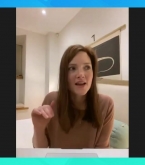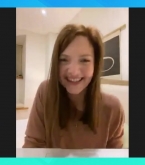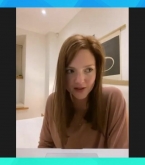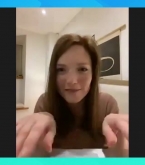As I previously expected, Holly has been invited to some interviews to promote the release of S2 of The Capture in Peacock! For now, 1 video interview (look how long her hair is!) and a written interview as well:




The Capture: Holliday Grainger Details Upping the Ante for the Thriller’s Second Season (source)
In an interview with CBR, The Capture star Holliday Grainger talks about raised stakes and heightened paranoia in Season 2 of the Peacock series.
In an exclusive interview with CBR, The Capture star Holliday Grainger described upping the ante and taking Rachel Carey into darker areas in Season 2. She teased what fans can expect and praised the cast and crew, including series creator Ben Chanan, for crafting such a heightened thriller perfect for the Information Age.
CBR: The Capture Season 2 really starts with Rachel Carey in the lion’s den, now under surveillance and with no one to lean on. How was it starting off the season with this status quo in mind?
Holliday Grainger: It’s great! In a way, in Season 1, she’s quietly confident, and then she kind of builds balls. [laughs] In Season 2, she’s kind of broken a bit at the beginning; broken but steely. As it goes on, the stakes and fear get higher, but her resolve is always steadfast.
It could’ve been easy for Rachel to surrender in the face of constant scrutiny, but she doesn’t. She’s taking self-defense classes and finding new ways to empower and defend herself. How is it exploring this determined physical side of the performance?I love the self-defense stunt stuff because I think acting is quite cathartic. It’s a release. [laughs] To get to do acting where you beat someone up, it’s like leaving work for a zen weekend or whatever. [laughs] I love the physical side of the job!
Did any of that physicality inform your body language or the way Rachel carries herself this season?
There is a fear that she has for her life and knowing she has this confidence in her abilities that therefore makes sense of her ballsiness. [laughs] I remember one of Ben [Chanan]’s stage directions at the beginning of this season when he was describing Carey’s paranoia and anxiety in being watched all the time. He just described her walking into work with the power walk gone. That made a lot of sense physically for [the] character because, for as much as she’s building, she’s also kind of diminished at the beginning and has to build herself back. By the end [of the season], I think the power walk is definitely there again. [laughs]
Two seasons in, how has it been working with Ben Chanan and getting used to his scripts and the way he works on set?
It’s amazing! I think Ben is just brilliant because he directed the entirety of Season 1, and I don’t know how he had time to sleep. He didn’t direct this [season]; he wrote and was the showrunner, but he was definitely very involved. I think he’s described The Capture as being his baby, and he’s created this world so meticulously; he’s so well-researched. I think, having worked with him for two seasons, there’s a level you get to where there’s a level of shorthand in understanding. It gets much easier to understand Carey — the style, her thought process, and what’s going on. You can follow the plot easier because you know Ben’s inner thought process better, I think. [laughs]
The Capture scripts strike me as quite dense with their legal, thriller, and technical jargon. Was it easier getting all that down to prepare and film this season?
Yeah, definitely! I found the prep for Season 1 quite hard because it was the most prep I had done for anything. I shadowed the police for quite a while to make sense of the police in that world and did a lot of work on the script. I’m not usually someone who writes notes on the script, but my scripts for Season 1 had notes and post-its all over them because we shot all six episodes at once. We were just holding the plot in our heads because, with Carey’s role, Ben’s given me the role of storytelling and holding the plot. In Season 1, he didn’t necessarily put a lot in the stage direction, so I had to follow when she was learning something and when she knew things. It felt high pressure to tell the story right in terms of the memory of where everyone was, especially shooting six episodes out of sequence. Getting to know his writing and rhythm, that job became much easier in Season 2. It didn’t feel as epic to prep. [laughs]
In filming out-of-sequence, how do you chart where your character is mentally in a given scene as she either descends or rises psychologically?
It’s just memory. [laughs] That’s when directors and continuity people really come in handy. At the beginning of shooting, I feel like you’re confident and on top of it, and by the time you get to the end, you’re so tired. You’re like, “Does she know that then or not?” [laughs]
Rachel finds a kindred spirit in Isaac Turner as he finds himself targeted in the public eye. How was it exploring that dimension to your character and striking up that rapport with Paapa Essiedu?
One of the things that I find interesting about Season 2 is there isn’t a massive amount of screen time between Carey and Isaac. I think the very first time she meets him in the safe house, she watches him go through a sort of sped-up version of what she went through in Season 1. There’s a lot about them that is similar. He has the same… I wouldn’t call it naïveté or innocence, but there’s a purity to Isaac in the way that there’s a purity to Carey, which is an integrity. The idea that he’s involved in the world of politics and government in earnest and wanting to do right, she wanted to do the same in the police force. To be un-blindfolded, have the rug pulled out from under you, and [face] the corruption in the institution that you really put your heart into, I think there’s a brokenness that happens. I think she saw that happen with Isaac, and he recognizes her recognizing that in him. Immediately, there’s this sense of, “I know you. We’re the same,” and I think that informs them being a team.
How was it working with Paapa to figure that dynamic out?
He’s so brilliant and perfect for Isaac. It was kind of easy. [laughs] Not easy, but when you work with someone who knows what they’re doing, it makes your job feel a lot easier. What’s also brilliant is that I watched the series, and I enjoyed it because there’s so much of the story that I wasn’t there to witness, so you can really enjoy watching him as an actor and storyteller.
After filming Season 1 in a relative vacuum, how was it seeing the audience’s response, and did that inform how you approached Season 2?
It was exciting! What was great about Season 1 is that it really felt like it was slow-burning. Six months after it had aired, people were still coming up to me, going, “Oh my god, I was watching the series last night! What happens?!” People were so genuinely excited about the plot, so if people recognized me, they’d come up to ask me about what would happen. [laughs] I think the plot is so complex and fast in Season 2 that you’re really aware of not wanting anything to slide and do the best you can with the storytelling. I’m saying “storytelling” so often, but people really resonated with that character! [laughs]
The Capture isn’t the first thriller you’ve done. What is it about the genre that you find personally interesting as an actor as opposed to, say, your historical dramas and epics?
I think a lot of it is that it’s almost like comedy, in a way, that you have to work with the director in making sure the timing’s right. It’s the same with thrillers because you have to be on the same team of building that suspense and the journey. It’s not just [an] emotional journey but one where the suspense and fear within Carey become more important because you kind of have to lead and build the arc. It’s not just about character — it’s about plot as well and where you’re taking the audience with the suspense.
Two seasons in, what has surprised you the most about Rachel Carey’s journey?
Honestly, she always surprises me because she’s so smart. She’s always two steps ahead — though she’s always two steps ahead of me as an actor as well. [laughs] Reading the scripts, as much as you know she’s always got integrity, you’re always questioning if she’s still going to stick to her guns and succeed. It makes it all the more gratifying when she does!
What else can you tease about The Capture and the wide, wide adventures of Rachel Carey as we go into Season 2?
If you loved the first season, you’ll love this season even more because the stakes are higher, the drama is higher, [and] the world is wider. It’s everything you loved about the first season but even more heightened — the stakes are higher!
There’s a new interview to add to this post, this time by Collider where she also talks a bit about Strike:
Holliday Grainger Talks ‘The Capture’ Season 2 and ‘C.B. Strike: Troubled Blood’ (source)
During this 1-on-1 interview with Collider, Grainger talked about how they intentionally set up the possibility for a second season at the end of Season 1, making it hard for the hero to win in a world like this, what most surprised her about the tech aspect of this story, why she enjoyed the dynamic between Rachel Carey and Isaac Turner, and how she feels about the end of the season. She also talked about the upcoming fourth season of C.B. Strike, which is the four-part story of Troubled Blood, and the differences between Rachel Carey and Robin Ellacott, as characters.
COLLIDER: I really enjoyed the first season and was very curious about where things would go in the second season, so I was happy to see what a roller coaster ride it was.
HOLLIDAY GRAINGER: Good, I’m glad.
When you did Season 1, did you know that there was the possibility of continuing for a second season?
GRAINGER: Yeah, I knew that (show creator) Ben [Chanan] had an idea for the second season. It wasn’t fully formed, but I knew that he did want to take it on. It was interesting, when we were filming Season 1, Ben doesn’t always do loads and loads of takes, but we did so many takes of the very last line, which was something like, “When can I start in Correction?” We did so many takes of that, just to play with the ambiguity of it, for where he wanted the audience to start in Season 2. So, I was hooked to see where he was going to take it.
With where things were left in the first season, what were you most curious about? What were the biggest questions you had about Season 2, and do you feel like you had those questions answered with what Season 2 turned out to be?
GRAINGER: Yeah. It’s interesting to see what happens to Carey and Isaac, over the course of Season 2. In Season 1, you’re really left with the question of, “Is she just going to be such a hypocrite and go against all her morals? Is this what happens in the world. Is she going to be completely corrupted? Or is she going to have a steely backbone and be the one that exposes Correction?” There’s so much cynicism in the world that we all want to root for the hero. Ben’s world of The Capture is so honest and so Black Mirror cynical, that you’re just like, “How can the hero win in this world?” It’s interesting, in Season 2, to see Isaac go on the journey that I thought Carey might go on. He is corrupted and bent by power, and Carey’s not. It’s quite interesting to see.
What did you find most interesting, fascinating, or even scary about the tech aspect of this story?
GRAINGER: It really opened my eyes to the amount of CCTV used, especially in London. I had no idea that the CCTV blind spots are so small and that the pockets are really minimal in London. We all know how much there is the potential for us all to be surveilled in our home tech and everything that we have in our day-to-day lives. You just want to turn a blind eye to it. We never read the full print on the apps that we have. We don’t know what app is tracking what, and who’s filming what, and who’s listening to what, because we don’t really want to know. What’s great about The Capture is that it makes you question that. It makes you go, “Do I really not want to know?” It leaves you questioning not only what you see, but your own security.
People don’t like to think about the fact that any one of us, or all of us, can be traced through our phones at any time.
GRAINGER: Yeah. What’s funny is that sometimes I’ll hear people talk about Season 2 of The Capture and I feel like there are two camps. Some people are like, “Oh, my God, it’s so real. It could happen to you. This could be happening.” And some people are like, “Oh, it’s so farfetched. That will never happen.” I’m always like, “Oh my god, you have no idea.” We have advisors on The Capture, and it’s quite scary, speaking to them about how plausible everything is.
Would you say that your character is calm under pressure, or is she just good at pretending to be able to keep her cool even if that’s not how she’s feeling?
GRAINGER: I’d say a bit of both. She’s someone whose brain cogs work incredibly fast. I think the more pressure that’s on her, the faster her cogs work. In a sense, she’s always trying to be two steps ahead of any situation she’s in. But her level of anxiety is all internal.
There are two terrifying aspects of this story to me, how someone could not only create a deep fake of another person but also do it in real-time, and then the ability to just make people invisible from cameras so that even if you’re watching something, you don’t know what’s coming. How did you feel about both of those aspects of the story? Did that just completely freak you out?
GRAINGER: Yeah. We all want to believe what we see in the news, watch on the TV, see in newspapers, or whatever it is, but if we don’t know whether to believe what we’re seeing, having to second guess everything is really disconcerting.
What was it like to get to explore the dynamic between Rachael Carey and Isaac Turner, this season?
GRAINGER: I love the journey that Isaac and Carey go on. For Carey, it’s a journey of trust. They both start from a place of completely mistrusting, and then because they recognize themselves in each other, there’s an immediate bond and a trust there. At the beginning, Carey trusts no one and is completely mistrusted in her workplace. She puts all her faith in Isaac, and it’s broken. That’s the most heartbreaking. The scene with her and Isaac, where Isaac denies that he has knowledge of Correction and their pact, I always feel like that’s a mega relationship breakup scene. It’s the idea of a long-term relationship coming to an end because it’s that level of gut-wrenching. She built this trust, and then it’s whipped out from under her, which is proof that she can’t trust anyone.
By the end of the season, do you feel like the actions Rachel Carey takes really allow her to regain control of her life? To me, it felt like she was trying to take back what had been taken from her.
GRAINGER: Oh, absolutely. What’s interesting is that you join her at the beginning of Season 2 in this place of paranoia and anxiety. She’s mistrustful and mistrusted, and for good reason. Her life is in danger, and she is clever enough to forward think and really regain that control back from other people who’ve stopped her. I’d be really interested to see where Ben might take it for a Season 3 if that ever happens. At the very end, you think she’s won, but then there’s the idea that Correction is exposed. What would that do to her life? I feel like she’s battled to get herself to a place of regaining control, and then she’s about to completely lose it even more so because of Correction being exposed. What would that lead to?
I’m also such a fan of the work that you do on C.B. Strike. That’s another great character. What can you say to tease what fans can expect from the upcoming episodes of that series?
GRAINGER: My head is so in C.B. Strike, at the moment, because I just finished reading the sixth book last night, The Ink Black Heart. I just get so absorbed in J.K. Rowling’s writing, as the rest of the world does. The next episodes (Troubled Blood, Parts 1-4) are a cold case. In terms of the Strike-Robin journey, it’s that will they or won’t they. There’s more of the same. You’re still with them on the will they or won’t they journey.
What do you most enjoy about Rachel Carey and Robin Ellacott? What have been the most fun aspects of getting to play both of those characters? What do you think they would think of each other if they were ever to meet?
GRAINGER: I would love to see if Rachel and Robin would get on. The major difference between them is that Robin’s a people pleaser. She likes to be liked, and she’s quite calm and empathetic. And I feel like Carey just doesn’t really give a shit what other people think. Whether or not they would get on would completely depend upon the circumstances in which they met. I feel like they both have ambition and passion for their work, so I feel like, if they were on the same side of an investigation, they would really get on and respect each other. But if they were at loggerheads and trying to hide information from each other, they would hate each other.
Do they feel very different when you play them?
GRAINGER: Yeah, they do. It always feels a lot more high-pressure, doing The Capture. Maybe it’s because you can never quite leave your work at work. As much as Rachel Carey always appears calm and collected, she’s always in a heightened state of anxiety. She’s got so much at stake and so much going on. Playing that is quite difficult because you feel like a bottle being shaken. There’s something much more grounded and open about Robin, which makes it feel easier to leave, at the end of the day.